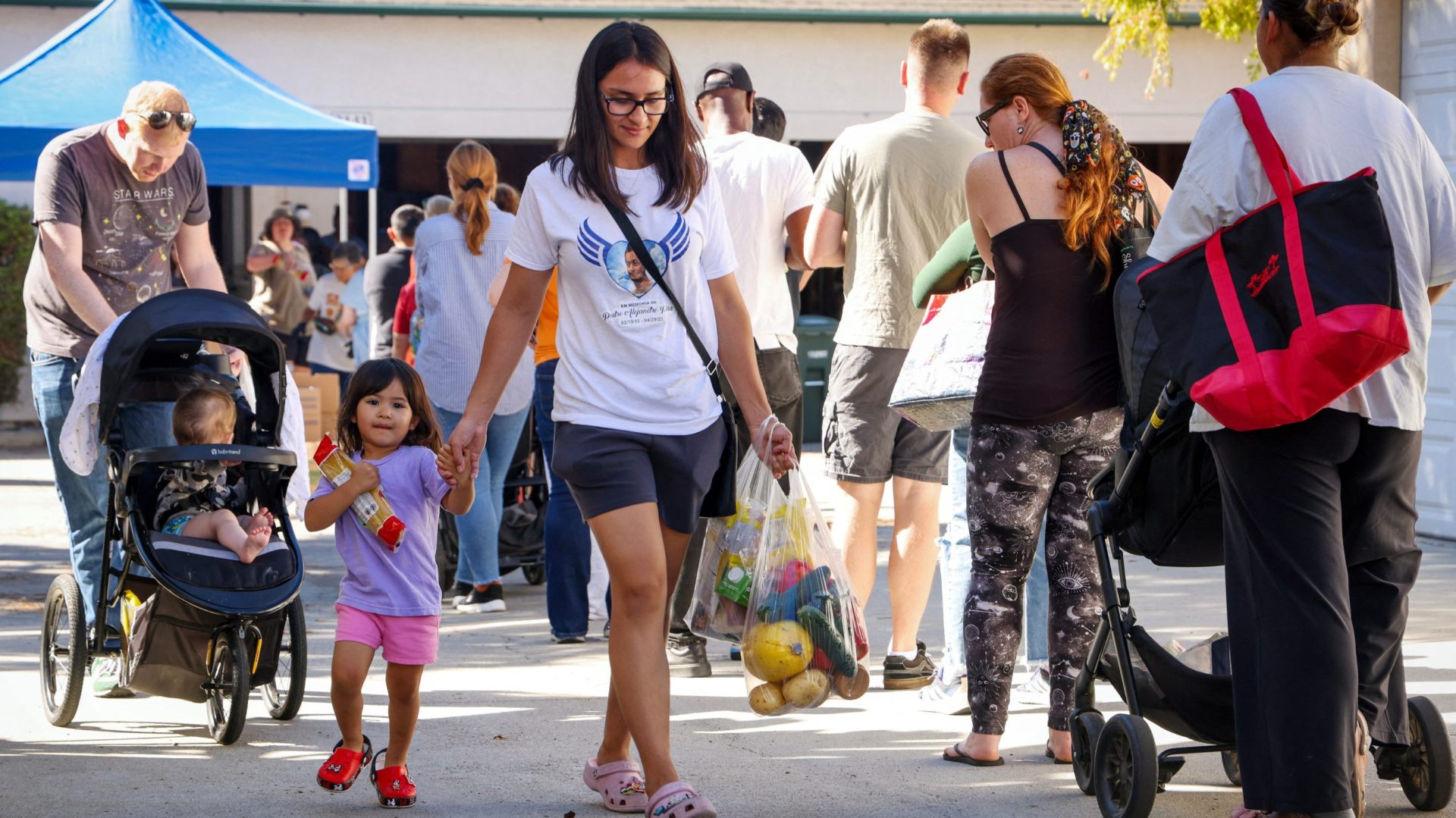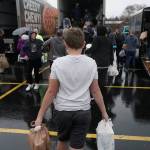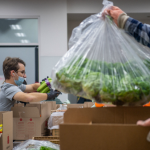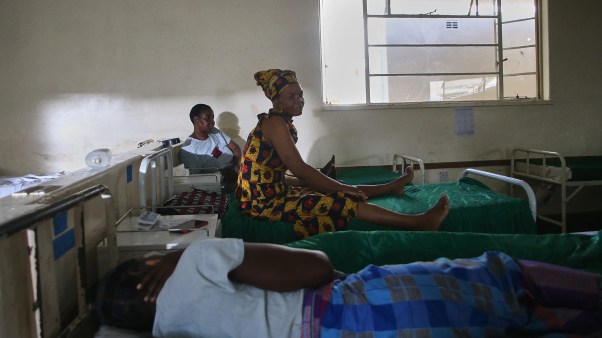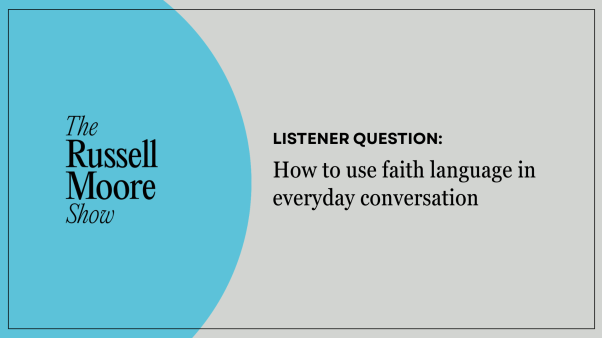A month into the government shutdown, The Community Hope Center began to notice different faces at its regular food distribution in Gaithersburg, Maryland.
In an average month, the center serves around 4,000 households in partnership with the city. This month, people who hadn’t needed to visit its food pantry since the COVID-19 pandemic returned, and families who had never come for food assistance showed up for the first time.
“We are seeing a lot of new people come in and different people from all walks of life,” said Sharon Camacho Meakes, executive director of the nonprofit, which is affiliated with Seneca Creek Community Church.
Hunger ministries around Washington, DC, are navigating the second-longest government shutdown on record: More than 1 million federal workers are not being paid while Congress fails to pass a budget, and on November 1, the government will halt funding for food stamps, meaning more families that rely on federal assistance will turn to community organizations for help.
Capital Area Food Bank, which serves DC and neighboring counties, has scheduled food distribution days specifically for federal workers. The nonprofit partners with around 400 organizations as distribution sites in the area, many of them faith-based. Seneca Creek Community Church is one of those spots, and volunteers from the church showed up in full force on Wednesday.
Federal workers and contractors bundled up in coats and sweaters waited in a line that stretched outside the church in the brisk October air. Moms pushed strollers or wrangled busy toddlers, older adults came with adult children to help them carry boxes, and a few 20-somethings in business casual shivered in the cold.
Inside, volunteers handed out boxes of food and told workers about other ministries that could help, including one that distributes winter coats.
“I have a lady with a baby who needs help,” one volunteer in the food distribution line called.
“I’ll take her,” said a woman sporting a Capitol Area Food Bank black hat as she sprang into action.
The volunteers shepherded the mom, with squirming baby in tow, through the line and out to her car, where they loaded up a box of shelf-stable food and a box of produce, which include items like pasta, canned tomatoes, tuna, white chicken, beans, peanut butter, and cereal. The organization plans to continue the weekly food drives for federal workers until the shutdown ends.
“Thank you and God bless you!” Jackie Chips, a church volunteer near the end of the distribution line, said as she handed boxes to the federal workers.
“The need is great, and it’s going to get greater,” Chips told CT. “But prayer is powerful.”
The US Department of Agriculture (USDA) has instructed states to hit pause on sending out November Supplemental Nutrition Assistance Program (SNAP) payments, and the administration has said it cannot use contingency funding to keep SNAP going.
More than 47 million Americans don’t have enough food or don’t know where their next meal will come from, according to the USDA’s 2023 report, the most recent data available on the topic. (The Trump administration did not release a report in 2024 and canceled future reports.) Over 7 million children live in households with food insecurity.
Many of them—42 million—use SNAP, and another 6.7 million women and children are on the Women, Infants, and Children nutrition program (WIC). The availability of WIC funds beyond this month varies by state.
Some states are making up for the pause in federal funding: California plans to deploy the National Guard to help with food distribution and divert millions of dollars to food banks. Virginia declared a state of emergency to use state funds to provide SNAP to recipients. In Louisiana, the governor signed off on using state health department funds to replace lost SNAP funding for the first week of November. But some states are unable to cover the funds, and more than two dozen states are suing the administration and asking that it use reserve funding to cover the gap.
The looming cessation of SNAP benefits exacerbates already-strained resources at the country’s food banks, which saw a rise in demand as grocery prices continue to climb.
Heather Taylor with Bread for the World said the need could very quickly reach “catastrophic levels” that outpace food charities.
“A lot of folks who are on SNAP, they’re already struggling because the amount that they receive typically does not last until the end of the month. So they’re already stretching and leveraging charity, leveraging food banks,” added Taylor, who is managing director of the Christian antihunger organization.
“Our fear, from what we’re hearing and reading, is that people will take extreme measures, like parents not feeding themselves at all, to do what they can to have a minimal amount of food for their children.”
She said Christians have a moral obligation to help meet the needs of their hungry neighbors.
In Congress, Senate chaplain Barry Black took it up with the Almighty in full earshot of the politicians at the heart of the stalemate as he offered an opening prayer Tuesday.
“Lord, remind our lawmakers that no gold medals are given for breaking shutdown records, but a crown of righteousness is given to those who take care of the lost,” Black prayed.
The chaplain, who is a Seventh-day Adventist, has had the longest consecutive tenure among Senate chaplains. He’s used prayer during shutdowns before to highlight their impact on the vulnerable.
While many federal workers receive back pay, contractors for the government do not. They’ve already missed two paychecks, and one federal worker in Maryland, Stephanie, told CT she’s worried it will push back her plans to retire next year, since the shutdown has meant she’s needed to dip into her savings to pay her mortgage. “This might be a setback,” she said.
CT agreed to withhold last names, as workers were worried about employment repercussions for speaking to the press.
Stephanie is frustrated with what she sees as politicians “bickering.” “Why take it out on us?” The 66-year-old asked.
Gabriel Salguero, president of the National Latino Evangelical Coalition, is also praying for an end to the stalemate in Congress. Since the shutdown started, his church in Orlando, The Gathering, has fielded more requests for monetary assistance from its benevolence ministry. Church volunteers saw longer lines at last week’s food pantry.
“The pastors in our coalition, from Chicago to Texas to North Carolina to Florida to New York, they’re seeing those numbers are increasing,” Salguero said.
Salguero knows food insecurity firsthand. For part of his upbringing in New Jersey, he and his siblings relied on reduced-price lunch cards at school and went hungry at home sometimes, eating sandwiches of peanut butter and jelly or just mayonnaise and bread.
Those leaner years shaped his understanding of Matthew 25: “For I was hungry and you gave me something to eat, I was thirsty and you gave me something to drink, I was a stranger and you invited me in, I needed clothes and you clothed me” (vv. 35–36).
“This is not an abstract thing,” Salguero said. “We’re going to continue to advocate for both sides of the aisle to come together so that children and elderly people and the vulnerable are not going to bed hungry.
“For me, the church is always going to be the church. We’re not going to stop feeding people,” he said. But he is praying the government finds a way forward soon. “No matter how much we do, we could never cover the need that’s out there.”
“One thing that’s very clear is that nobody thinks that private philanthropy can patch the whole gap created by the sudden withdrawal of SNAP,” Galen Carey, vice president of government relations with the National Association of Evangelicals (NAE), told CT. He’s already hearing reports from Christians about nearly empty shelves at Salvation Army and other food pantries around the country.
NAE and Bread for the World support politicians passing a stopgap measure, like Sen. Josh Hawley’s bill The Keep SNAP Funded Act of 2025, or the administration using emergency funds. Some politicians have resisted efforts to pass stopgap funding on the grounds that it prevents lawmakers from feeling pressured to negotiate an end to the shutdown entirely.
“There’s an awful lot of churches who are just concerned about making sure that kids aren’t going to bed hungry,” he said. “They’re happy for that problem to be solved in whatever way it can be solved.”
At Wednesday’s food drive in Gaithersburg, Seneca Creek lead pastor Mark Tindle told CT that while the community has been hit hard, even some furloughed workers in his church have shown up to volunteer.
One federal employee in a food line told CT he felt “completely blindsided” by the shutdown. Tyrell, a Marine and father of three, said the pause was draining his bank account and he still had to report to work despite not being paid. He delivers for DoorDash at night to cover rent and medicine for one of his daughters.
“What happened to making America great again?” Tyrell asked. He said he’d thought about reaching out to members of Congress but didn’t know if it would make a difference. When asked who he voted for, his response was succinct: “Not this.”
Tyrell said he is leaning on his faith during the uncertainty. After he got through the line, he loaded the boxes into the back of his car. On the rear window, a white sticker spelled out “In God We Trust.”
Correction: An earlier version of this story misstated the name of the National Association of Evangelicals.

